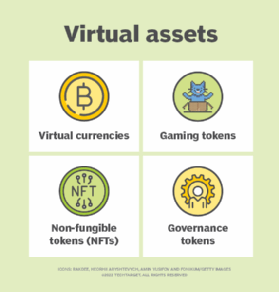virtual asset
What is a virtual asset?
A virtual asset is a digital representation of an item that has value in a specific environment. This medium of exchange or property can be digitally traded, transferred or used for payment or investment purposes. The most common example of a virtual asset is virtual currency such as Bitcoin, Litecoin, Ethereum or Dogecoin. Gaming tokens, non-fungible tokens (NFTs) and governance tokens might also be considered virtual assets, depending on the circumstances and the context in which the assets exist and are used.
Who governs digital assets?
The Financial Action Task Force (FATF), an inter-governmental body, sets international standards aimed at preventing money laundering and terrorist financing. Part of that effort has been to bring clarity to how virtual assets should be defined and regulated on an international basis.
The FATF defines a virtual asset as "a digital representation of value that can be digitally traded, transferred and used for payment or investment purposes." This definition is included in the organization's global recommendations on combatting money laundering and the financing of terrorism, as well as the proliferation of weapons of mass destruction. More than 200 countries and jurisdictions have committed to implementing these recommendations as part of a global, coordinated response to prevent organized crime, corruption and terrorism.
That said, the FATF definition doesn't apply to all digital assets. For example, the FATF definition can include assets that someone issues or transfers to another person or that are exchanged for something else. However, it doesn't include digital representations of fiat currencies, securities or other financial assets, which are covered elsewhere in the organization's recommendations.

Virtual currencies are almost always considered virtual assets and are covered by the FATF recommendations. In the past decade, virtual currencies have proliferated and brought with them the potential for abuse, corruption and illicit activity, which is what led to the FATF recommendations.
According to the U.S. Department of the Treasury, a virtual currency is a "digital representation of value that functions as (i) a medium of exchange; (ii) a unit of account; and/or (iii) a store of value; and is neither issued nor guaranteed by any jurisdiction." This description fits neatly into the FATF definition of a virtual asset and the idea of a digital representation of value. The FATF definition can also apply to stablecoins, a type of virtual currency whose value is tied to an outside asset such as the Euro or U.S. dollar.
Virtual assets, digital assets and NFTs
The terms virtual assets and digital assets are sometimes used interchangeably, but digital assets are a much broader category that includes virtual assets and other types of assets. All virtual assets are digital assets, but not all digital assets are virtual assets. For example, a digital bank record that represents an individual's ownership of fiat currency isn't considered a virtual asset because it's only a declarative record of ownership. The record itself can't be digitally traded for another asset. However, if a digital asset can be exchanged for another asset such as stablecoin, it might qualify as a virtual asset.
According to the FATF, virtual assets are distinguished from other types of digital assets by whether they have an inherent value that can be "traded or transferred and used for payment or investment." If the asset is used merely to record or represent ownership of something else, it doesn't qualify as a virtual asset. Those assets might fall under other FATF standards, but not the ones that govern virtual assets.
The FATF is open ended in its recommendations on NFTs, which are digital assets that are unique and non-interchangeable. For the most part, the FATF doesn't consider NFTs to be virtual assets -- unless they can be used for payment or investment purposes. For example, if an NFT can be exchanged for fiat currency, it might be considered a virtual asset and subject to the FATF standards. When it comes to NFTs, the FATF has left room for interpretation.
What are virtual asset service providers?
Virtual asset service providers (VASPs) are organizations or individuals that conduct activities related to the exchange, transfer or administration of virtual assets. The FATF is as concerned with VASPs as it is with virtual assets because regulating VASPs can play a vital role in preventing money laundering and terrorist funding.
The FATF defines a VASP as an entity that conducts "as a business" one or more of the following activities or operations for someone else:
i. Exchange between virtual assets and fiat currencies;
ii. Exchange between one or more forms of virtual assets;
iii. Transfer of virtual assets;
iv. Safekeeping and/or administration of virtual assets or instruments enabling control over virtual assets; and
v. Participation in and provision of financial services related to an issuer's offer and/or sale of a virtual asset.
As with virtual assets, the VASP definition should be taken broadly "without regard to an entity's operational model, technological tools, ledger design, or any other operating feature." Additionally, the definition shouldn't be applied to entities covered elsewhere in the FATF recommendations nor to entities that carry out these functions infrequently on a noncommercial basis. However, it does include any services that facilitate the exchange of virtual assets for fiat currency or that enable individuals to transfer ownership or control of virtual assets.
For more information: Compare NFTs vs. cryptocurrency vs. digital currency
